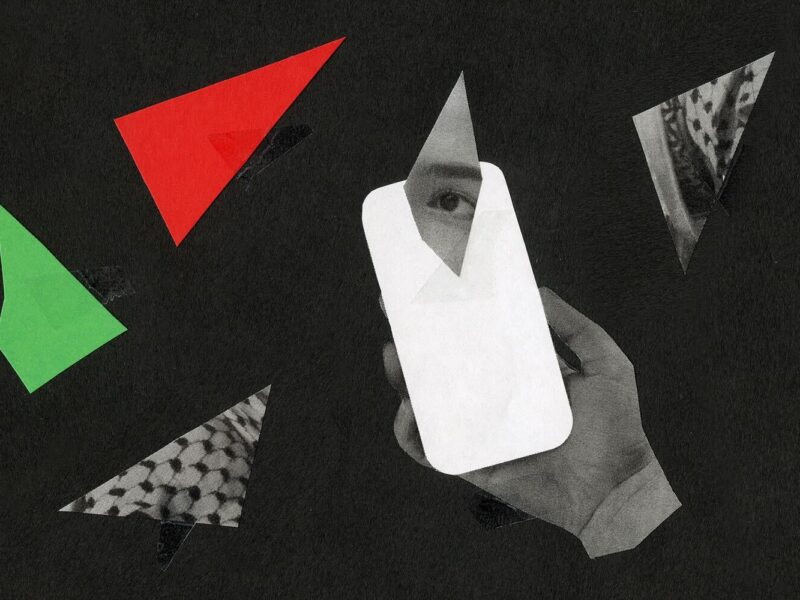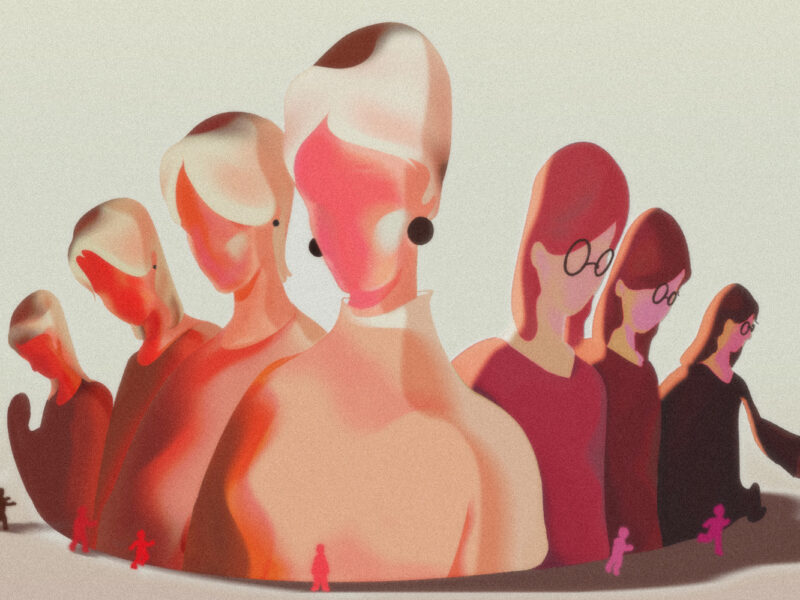In her new memoir “Rebel Girl,” riot grrrl pioneer Kathleen Hanna reckons with her mistakes.
When I first saw Bikini Kill perform live in 2022, it felt like a long time coming. The groundbreaking feminist punk band hadn’t toured in two decades, and in the intervening years, legions of listeners like me had become devout fans, and frontwoman Kathleen Hanna something of an unwitting feminist icon. Most of us figured we’d never actually get the chance to see her, Kathi Wilcox, Billy Karren, and Tobi Vail together on stage again—at least, not like in the band’s heyday. Bikini Kill’s live shows were the stuff of legends: brash refutations of macho-dude punks, where the band tore through fierce odes to feminist solidarity, and Hanna yelled into the mic about wanting “revolution, girl-style, now”—famously demanding, at every show, that the crowd make space for young women to come up to the front of the room.
But that was 20 years ago. The three women I watched on stage in New York (Karren didn’t join the reunion tour) were not the same young punks who’d played in grungy basements in the ’90s. They were a couple decades older and wiser; still committed to their feminist principles, but changed, years of experience and new perspectives now coloring their rallying cries. At the show I saw, Hanna’s slogan—“Girls to the front!”—got an overdue, if slightly clunky, corrective. It wasn’t just girls who deserved space at these shows, Hanna explained. Nonbinary people deserved to occupy that space, too, as did trans men—anyone who usually got shoved aside. It made sense to me that Hanna would reject—or at least reframe—her original sentiment, even if it temporarily robbed the iconic phrase of some of its power. The context around Hanna had changed, and punk had, too: Where she used to look out from the stage and see only a handful of young women, their views blocked by a moshpit of guys, she now saw a respectful, diverse crowd who didn’t have to be asked to make space for each other, because they’d already done it themselves.
I thought about this shift in punk feminism while reading Rebel Girl, Hanna’s new memoir, released last month. It’s a dense, often chaotic book that careens through Hanna’s fascinating life: her difficult childhood, her entrée into the punk scene, her early days on tour with Bikini Kill, then later as a solo artist and with Le Tigre and The Julie Ruin. Throughout, Hanna grapples with what it means to be an artist and an activist, and how the sexist conditions for women in rock music have—and haven’t—changed since she first started making music. Hanna makes it clear that she never set out to become a feminist icon (she started a band, she writes, simply because she wanted “to be heard”), and that riot grrrl was always intended to be an anti-hierarchical movement, without a clear, singular leader. Maybe this is why what struck me most while reading Rebel Girl wasn’t Hanna’s righteousness, or her many triumphs, but the way she acknowledged her shortcomings—and the failures of the riot grrrl movement she helped pioneer.
With startling honesty, Hanna reflects over and over on the ignorance afforded to her by her privilege, a rare thing to witness from a celebrity of her magnitude. In one incident, she writes about offending Kurt Cobain, whom she’d initially befriended over their shared feminist politics. He’d gotten icy after she gifted him a copy of an inflammatory manifesto, and Hanna realized he may have felt like she was lording her expensive college education over him—“acting like Ms. Smarty Pants College Girl who had come to educate dumb working-class Kurt,” as she puts it, despite having worked as a stripper to make ends meet when she was a student. It was a crucial moment in her early understanding of intersectionality. “Being constantly put down as a woman,” she writes, “had blinded me to my own power to hurt people.”
Eventually, she’d witness this same lack of awareness in her peers. On one occasion, she writes about organizing a workshop called “Unlearning Racism” at a riot grrrl conference, and quickly realizing how few of her fellow white feminists had begun to think about—never mind concretely take action against—the intersecting oppressions women of color faced within the punk scene and more generally. Again, Hanna acknowledges her ignorance. “I realized that day that many BIPOC women were as disappointed in white punk feminists as I’d been by white male punks,” she writes. “And that was the problem…I hadn’t seen how so much of our punk feminism was really just white feminism.”
It’s not an entirely self-recriminating book. Hanna, too, has suffered plenty under the patriarchy, and more than anything else, her main nemesis throughout Rebel Girl is the unending violence she’s experienced at the hands of men: the abusive behavior of her father, betrayal and assault from trusted friends, and all manner of stalkers, creepy sound guys, and violent showgoers on tour. The book, too, is filled with moments of joy: Hanna finding her voice as a singer, witnessing her music connect with young women around the world, falling in love, starting a family. Hanna has long sat among my personal pantheon of feminist heroes, and it was enthralling to encounter the magic and power of her art throughout the book, and to peek behind the curtain of a creative life I’ve long admired.
But it’s the moments of tension, disappointment, and misjudgment in Rebel Girl that I still keep returning to. When I first fell in love with the moral certitude of Bikini Kill’s lyrics, it was easy to assume a certain kind of ethical perfection on the part of their author. These stories—laced with choices I didn’t always agree with—reveal a bigger, more complicated picture, one that was deeply humanizing and, in its own way, comforting to me as a reader. Over the years, I’ve loved Hanna’s creative output and been inspired by her commitment to feminism. But like her, I’ve made plenty of my own mistakes and failed to live up to my values innumerable times. Rather than absolution, Hanna’s confessions function as an honest acknowledgement of an uncomfortable truth: staying true to your values in a world that doesn’t always align with them means constantly making hard decisions. By her own admission, she didn’t always get it right.
When I finished reading Rebel Girl, I thought again about that moment when Hanna talked about “girls to the front” in New York. The fact that times have changed doesn’t mean the slogan had been unimpeachable in the ’90s; if anything, Hanna’s relatively tame qualifiers of today would have been far more punk if she’d said them then. But just because her rallying cry wasn’t perfect doesn’t take away from the many people it inspired—and just because Hanna didn’t notice its limits then doesn’t disqualify her from seeing them and changing things now. Riot grrrl was a flawed movement, and Hanna a flawed person. Any version of history that ignores that fact erases the reality of what the feminist struggle actually looks like: exhilarating and empowering, yes, but also messy and filled with mistakes, both individual and collective. Rebel Girl feels all the more encouraging for its admissions of imperfection, as a humanizing reminder that even the most luminous icons have their flaws, and that striving for perfection at any cost can grind momentum to a halt. Instead, maybe it’s more powerful to take the mic when we have it, admit when we didn’t get things right, and make our way to the front, where we all belong.




